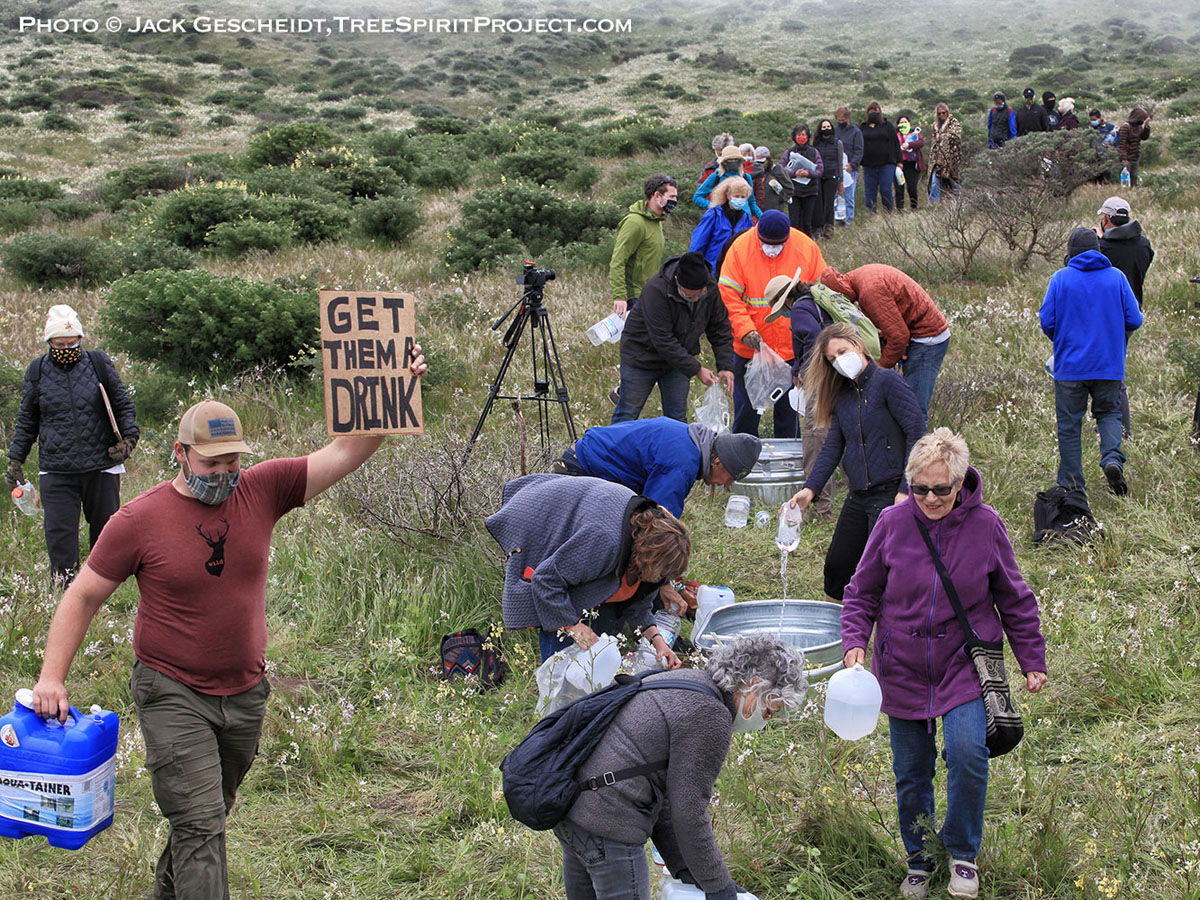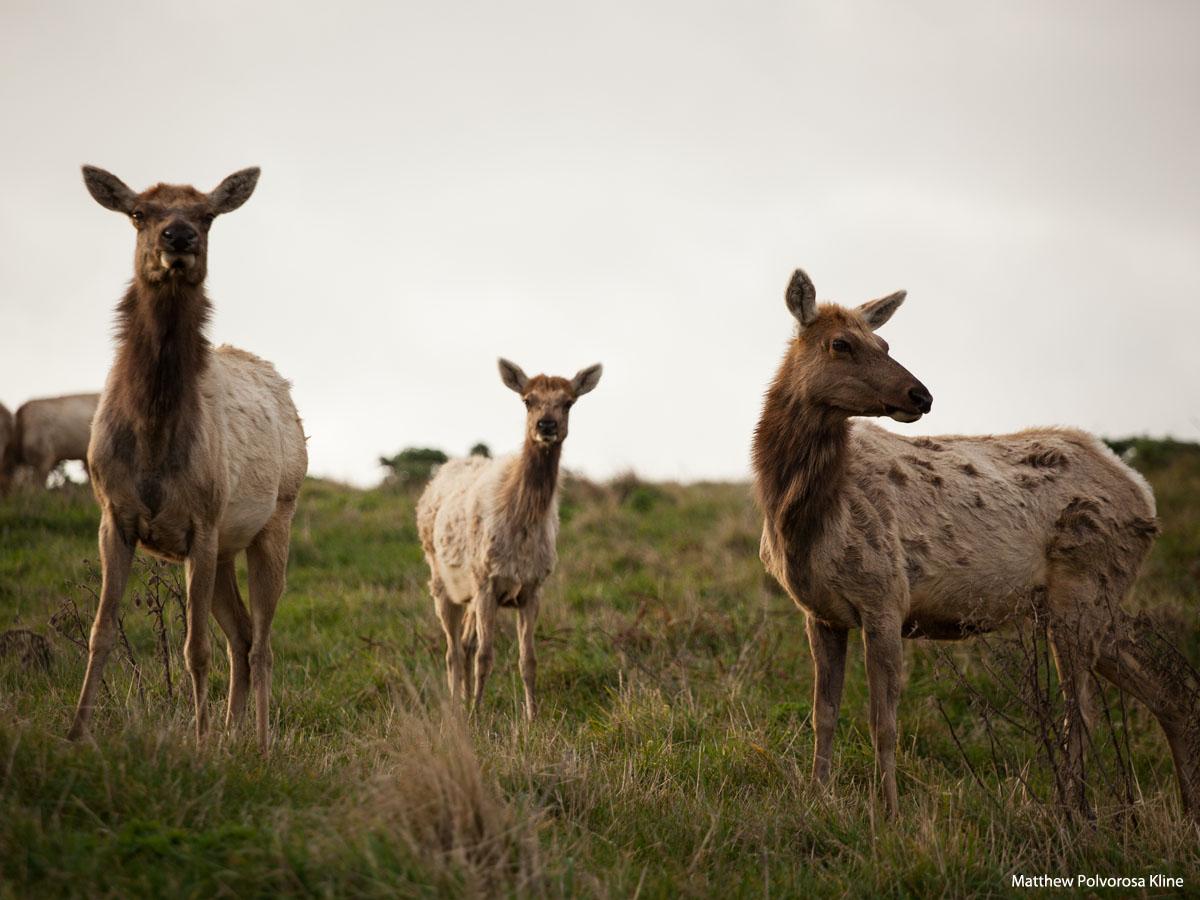MEDIA RELEASE: NPS Finally Concedes Thirsty Tule Elk Need Water
Point Reyes, Calif. (June 14, 2021) — In Defense of Animals, TreeSpirit Project and ForElk are pleased to learn the National Park Service (NPS) is finally providing some water for Tule elk trapped behind fencing inside Point Reyes National Seashore amid ongoing drought conditions — after thwarting activists’ attempts to deliver water four times.
“This is a good step, and we’re glad some elk will now have access to water, but many elk still won’t. This doesn’t solve the problem,” said Lisa Levinson, In Defense of Animals’ Campaign Director. “These elk are still captive animals in a national park who can’t access the forage they need, and they aren’t being provided for. This is unacceptable, and we’ll continue to call for the only real solution: removing the miles of fence confining them.”
For months, activists have been sounding the alarm over the situation, urging the NPS to intervene on behalf of Tule elk who are trapped by fencing in the Tule Elk Preserve at Tomales Point without access to adequate water and forage. They remain contained to 2,600-acres to keep them off 71,000 acres of land, including 28,000 acres reserved exclusively for 5,600 cattle. The privately owned cattle operations allowed to run inside the national park directly harm the elk.
The NPS has consistently said it would supply water should it become necessary, but that it wasn’t necessary — while elk continue to die. In April, the NPS announced that 152 elk — more than one-third of the 445 elk fenced in at Tomales Point — died over the winter, bringing their population to 293. Necropsies conducted on six elk indicate they were emaciated and deficient in copper and selenium.
Hundreds of activists have gathered to intervene in recent months to provide water to Tule elk, only to have it dumped out shortly after by the NPS. The NPS has removed 10 troughs activists provided, including two brought just one week ago.

In May, 100 activists gathered to bring water to thirsty Tule elk during a demonstration held by In Defense of Animals and TreeSpirit Project, only to have it dumped shortly after by the NPS. Photo: Jack Gescheidt, TreeSpirit Project
Now, however, the agency is finally acting. On June 11, the NPS announced it has placed three gravity-fed 250-gallon water troughs at the south end of the Tomales Point reserve, which will remain there until next winter.
“We take this confusing, contradictory narrative as proof that animal and environmental activists’ actions, including those of In Defense of Animals, ForElk and the TreeSpirit Project along with an upwelling of public support have finally created enough political pressure and damning publicity to provoke a response. But the root cause of the problems remain ignored: hundreds of elk are imprisoned inside a national seashore because 28,000 acres of land has been given over to subsidize private, for-profit beef and dairy operations with thousands of cows who pollute this protected seashore’s land, water and even its air with more greenhouse gases than all of the park’s 2 million annual visitor vehicles,” said Jack Gescheidt of TreeSpirit Project.
“Tule elk thirst and starvation remain unsolved. Only the elk in the southern portion of the Reserve will access this water. The northern herds will not,” said Diana Oppenheim of ForElk, an early supporter of the elk and Seashore’s cause. “All the elk in the Reserve will still suffer from inadequate forage because the area, like all of California, is currently drought-stricken.”
In May, Marin County declared a drought emergency.
The only effective solution is for the fences to come down, the elk to be released, and as soon as possible, move the private cows out of this public park to end their massive, ongoing, under-reported pollution.
“The Park Service has become like a private zoo-keeper who refuses to release his animals while also refusing to provide them adequate food and water. But this is a public national park unit, not a private zoo, and the animals are, by law, supposed to be wild, to roam free, not lethally fenced onto 2,600 acres inside a 71,000-acre national park,” added Gescheidt.
Fewer elk may die as a result of this new NPS action, yet some of the surviving 293 elk in the Reserve will likely still die of dehydration and malnutrition, unable to roam freely for water food inside a national park.
In Defense of Animals, TreeSpirit Project, ForElk and other elk, wildlife and national park activists will continue to advocate for the removal of fencing that confines these elk, and the removal of privately-owned cattle from this national park.
The public is encouraged to learn more and take action: http://www.IDAusa.org/elk
Contacts:
In Defense of Animals, Lisa Levinson, lisa@idausa.org, 415-879-6879
The TreeSpirit Project, Jack Gescheidt, jack@TreeSpiritProject.com, 415-488-4200
ForElk, Diana Oppenheim, action@forelk.org
Images: http://bit.ly/ElkWater
In Defense of Animals is an international animal protection organization based in Marin, California, with over 250,000 supporters and a 38-year history of fighting for animals, people, and the environment through education and campaigns, as well as hands-on rescue facilities in India, South Korea, and rural Mississippi. www.idausa.org/elk
The TreeSpirit Project raises awareness of the crucial role of forest, wildlife and the natural world in the lives of humans. Thousands of people have taken part in fine art community photographs that give people an actual experience of this interconnection beyond the virtual internet. https://treespiritproject.com
ForElk.org is a grassroots organization founded by Diana Oppeheim after she learned of the tragic fate of the Tule elk, to increase public participation and save this precious, rare species recovered from the brink of extinction, but still at risk today. http://www.ForElk.org
###ENDS###


